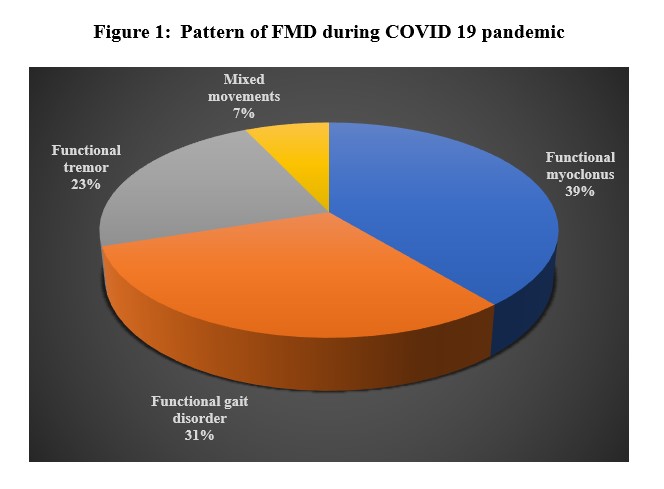Objective: To assess the frequency of functional movement disorders (FMD) during the COVID-19 pandemic in comparison to the pre-pandemic period and to identify factors causing increased incidence.
Background: An increase in FMD has perceived during pandemic period and an objective assessment of the same was performed.[1]
Method: This cross-sectional study, conducted during COVID-19 pandemic, included patients attending the movement disorder clinic in a tertiary care movement disorder centre over a 6-month period. Those with FMD documented by video evidence and followed up, and were compared against a baseline in the pre-pandemic period. Demographics, clinical features, frequency, and duration of FMD, presence of psychiatric comorbidity, as well as on anxiety (Hospital anxiety and depression scale [HADS-A] items), depressive symptoms (HADS-D) and sleep quality were recorded (Table 1).
Results: 22/382 patients (64% female; age-24.7 years [4-68]) seen during the pandemic (6 months) had FMD as compared to 31/ 1462 (67% female; age 26.9 years [5-63]) seen in the pre-pandemic period showing 2.71 times increase. Among the FMD, functional myoclonus was the most common (39%), followed by functional gait disorder (31%), functional tremor (23%) and mixed phenotype (Figure 1) . 91% had an abnormal score (>11) on HADS-A or HADS-D. Patients with higher scores on HADS had recurrence of events during follow up at 6 months. There was strong correlation between higher anxiety scores (p < 0.001) and poor sleep quality (p< 0.005) with FMD aggravation. After regression analysis, higher anxiety scores were the strongest predictor of increased FMD frequency.
Conclusion: The frequency of FMD was 2.71 times high during the pandemic suggesting the vulnerability of predisposed patients (as evidenced by their elevated HADS scores) during stressors. Coexistent anxiety and depression increase the risk of FMD relapsing, of which functional myoclonus was the most common phenotype.
References: 1)Machado M, Tarrano C, Mesrati F, Roze E, Vidailhet M, Aubignat M. Functional Movement Disorders During the COVID-19 Pandemic: Back to Charcot’s Era at the Salpêtrière. Mov Disord. 2022 Feb;37(2):432-434.
To cite this abstract in AMA style:
A. Cherian, D. Kalikavil Puthanveedu, N. Paramasivan, K. S. Increased incidence of Functional movement disorders during COVID-19 pandemic [abstract]. Mov Disord. 2023; 38 (suppl 1). https://www.mdsabstracts.org/abstract/increased-incidence-of-functional-movement-disorders-during-covid-19-pandemic/. Accessed February 17, 2026.« Back to 2023 International Congress
MDS Abstracts - https://www.mdsabstracts.org/abstract/increased-incidence-of-functional-movement-disorders-during-covid-19-pandemic/


